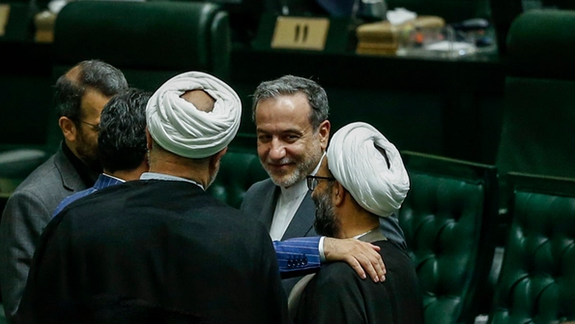During the second day of hearings for President Masoud Pezeshkian’s proposed cabinet, two key ministers received votes of confidence from relevant parliamentary committees. First was Intelligence Minister Esmail Khatib, and during the afternoon session, former nuclear negotiator Abbas Araghchi.
The 63-year-old diplomat, who has served for almost 40 years in the foreign ministry, left no doubt that his duty is to carry out the Islamic Republic’s policies under Ali Khamenei’s direction. "The 'Diplomacy of Resistance,' which is derived from the 'School of Resistance' and the result of the heroic efforts of Martyr Qasem Soleimani in designing the 'Axis of Resistance,' will be at the forefront of the foreign policy of the fourteenth government,” he said.
Araghchi emphasized: We will not lose our way, and unwavering, continuous, and comprehensive support for the cause of Palestine and the Lebanese Resistance, as well as other resistance movements fighting against the oppressive and criminal policies of the Zionist regime, will be at the top of our agenda.
He also vowed to "utilize all our political and diplomatic capacities to…garner support from regional countries and achieve the recognition of the Axis of Resistance actors on the international stage as popular and liberation movements."
Araghchi informed lawmakers that during the six rounds of nuclear talks with the West in 2021, he strictly adhered to Khamenei’s directives and the December 2020 parliamentary law requiring the lifting of US sanctions. He emphasized that, in line with Khamenei’s guidance, his foreign ministry would pursue "an honorable path" to lifting the sanctions. Notably, the foreign minister-designate consistently referred to these efforts as "sanctions-lifting talks" rather than nuclear negotiations.
He also vowed to do his utmost to circumvent sanctions or work to have them lifted. “Regarding sanctions, our policy is based on the recent guidance of the Supreme Leader in his meeting with the honorable members of parliament, focusing on neutralizing the impact of sanctions while simultaneously working to have them lifted. Foreign policy efforts aimed at neutralizing and rendering sanctions ineffective will support the government's objectives,” he stated.
Some regime politicians in Iran have argued that Araghchi’s appointment signals Tehran’s readiness for negotiations with the West. In an earlier meeting with parliamentary committees last week, Araghchi made two points: the 2015 nuclear deal (JCPOA) is beyond revival, and Iran should temper its hostility toward the United States.
However, there was another angle in Araghchi’s remarks last week. He did not mention the need for reaching any agreement that could address the concerns of the United States. Instead, he underlined that diplomatic and military pressure is needed to have the sanctions lifted.
On Sunday, Araghchi emphasized that he will be Khamenei’s “soldier” and expressed pride that Iran’s power has increased in the region and beyond. He also indicated his full agreement with Khamenei’s policy of alliance with China and Russia. "China, Russia, and other countries that have stood by us during difficult times and sanctions, as well as emerging powers and new arenas in Africa, Latin America, and East Asia, will be priorities in the foreign relations of the fourteenth government.”
Regarding relations with Europe, Araghchi repeated Tehran’s position, which aims to de-couple the Europeans from the United States. “If Europe corrects its improper and hostile behavior towards the Islamic Republic of Iran, it will be included in our list of priorities. Finally, our policy toward the United States will be one of 'managing hostility’."







